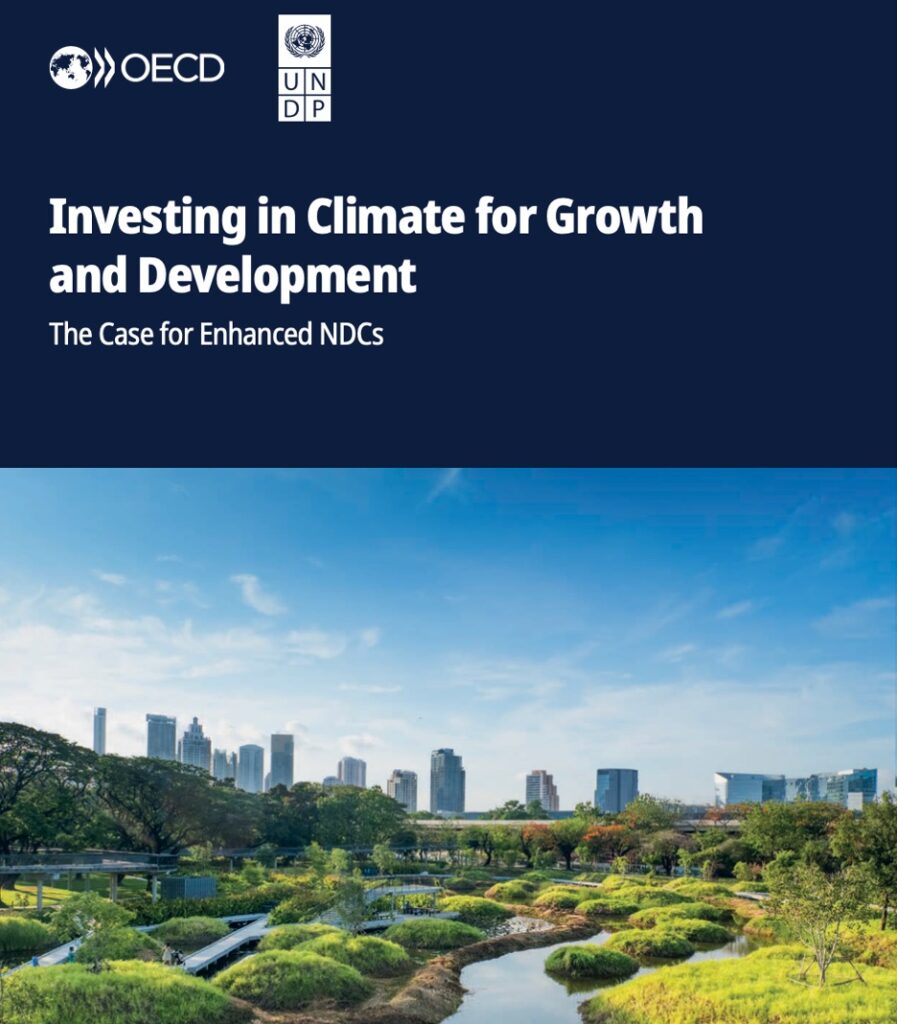Investing in Climate for Growth and Development
As the global community approaches the 2025 deadline for submitting revised Nationally Determined Contributions (NDCs), the joint OECD-UNDP report Investing in Climate for Growth and Development delivers a timely and compelling economic case for more ambitious and implementable climate action. The report shifts the paradigm from seeing climate action as a cost to recognizing it as a strategic economic opportunity—one that can simultaneously boost GDP, promote energy security, and reduce poverty and inequality.
The report’s central message is clear: enhanced NDCs are not only environmentally necessary but economically advantageous. Under an Enhanced NDC scenario aligned with the Paris Agreement, global GDP is projected to increase by 0.2% by 2040 compared to the Current Policies trajectory. This growth is primarily driven by investments in clean energy, increased energy efficiency, and the recycling of carbon revenues into public goods. By 2040, global GDP could grow by 60% over 2022 levels, with all regions poised to benefit, though at different paces.
More notably, the long-term benefits are even more profound. By mitigating the risk of climate-induced disasters—such as extreme weather events, crop failures, and sea-level rise—the Enhanced NDC scenario could lead to a global GDP gain of up to 3% by 2050 and up to 13% by 2100. These estimates may even understate the benefits, as they do not fully account for the catastrophic risks posed by tipping points in the Earth’s climate systems.
Beyond traditional growth metrics, enhanced NDCs provide substantial co-benefits. These include lifting an additional 175 million people out of extreme poverty by 2050, improving public health through reduced air pollution, and strengthening energy resilience by reducing dependency on volatile fossil fuel markets. These outcomes highlight the intrinsic value of integrating climate and development agendas—particularly in low-income and climate-vulnerable nations.
However, achieving these gains hinges on effective implementation. The report identifies five key priorities: (1) securing high-level political ownership, (2) aligning NDCs with national development goals, (3) engaging the private sector, (4) strengthening national and international finance institutions, and (5) ensuring inclusive stakeholder engagement. These steps are critical not only to mobilize the required finance—both public and private—but also to ensure a just and equitable transition. Special attention is given to supporting vulnerable populations—such as low-income households and workers in emission-intensive sectors—through targeted compensation and retraining programs.
The report also underscores that delayed or uncertain policy signals could reduce global GDP by up to 0.75% by 2030 due to dampened private investment. This reinforces the need for stable, predictable, and coherent policy frameworks. Additionally, it calls for better coordination between climate, fiscal, and monetary policies to manage short-term inflationary effects and crowd-in private capital.
Ultimately, Investing in Climate for Growth and Development presents a persuasive case that robust climate ambition, if properly designed and executed, serves as a vehicle for sustainable and inclusive economic development. The 2025 NDC cycle is a pivotal moment to transform these findings into action. Governments have a narrowing window to act decisively—not only to safeguard the planet, but to seize the economic dividends of a low-carbon future.
Sources:
- By Strategers


